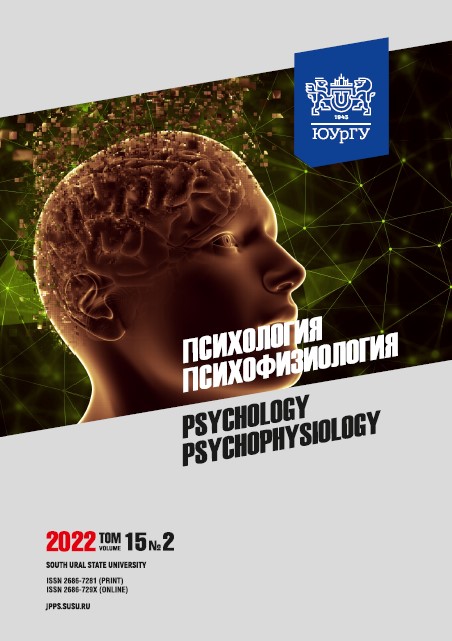Psychological potential of self-determination in the study of an agent of teaching activities
Abstract
Introduction. Humanistic transformations make relevant the person-oriented nature of education by focusing research interest on the motivational characteristics of teachers’ self-regulation. The idea of self-determination addressed to the agential origin of a teacher is becoming the leading one under the new conditions of education when it comes to heuristic ideas about teaching activities. Aim. This paper represents a psychological analysis of the essence and content of motivation for the self-determination of a teacher as an agent of self-realization. Materials and methods. The paper involves modern approaches to self-determination, including self-determination theory by E. Deci and R. Ryan and the theory of personal potential by D. Leontiev. These theories describe a person as a proactive, self-determined and free agent of life. The methods of problem-oriented and comparative analysis are used along with theoretically applied synthesis and conceptual generalization. Results. The conceptual model of teacher self-determination is provided as a multidimensional functional profile of a teacher. The sum of the structural elements of self-determination shape the psychological features of teachers’ motivation and values in modern education, which is characterized by ever-increasing complexity, ambiguity and uncertainty. The social importance of basic psychological needs (autonomy, competence, relatedness) is emphasized, as well as the importance of intrinsic and extrinsic motivation for personal and professional development of a teacher. Conclusion. The authors make conclusion about the creative and transforming nature of self-determination, which provides professional and existential self-realization of a teacher through self-affirmation.
Downloads
References
2. Lichnostnyi potentsial: struktura i diagnostika [Personal Potential: Structure and Diagnostics]. Ed. D.A. Leontev. Moscow. Smysl, 2011:680. (in Russ.).
3. Ryan R.M., Deci E.L., Vansteenkiste M. et al. Building a science of motivated persons: Self-determination theorys empirical approach to human experience and the regulation of behavior. Motivation Science. 2021;7(2):97–110. DOI: https://doi.org/10.1037/mot0000194
4. Ryan R.M., Deci E.L. Brick by brick: The origins, development, and future of self-determination theory. Advances in Motivation Science. Ed. Elliot A.J. Cambridge, MA. Elsevier Inc. 2019;6:111–156. DOI: https://doi.org/10.1016/bs.adms.2019.01.001
5. Vansteenkiste M., Ryan R.M., Soenens B. Basic psychological need theory: Advancements, critical themes, and future directions. Motivation and Emotion. 2020;44:1–31. DOI: https://doi.org/10.1007/s11031-019-09818-1
6. Reeve J., Cheon S.H. Autonomy-supportive teaching: Its malleability, benefits, and potential to improve educational practice. Educational Psychologist. 2021;56(1):54–77. DOI: https://doi.org/10.1080/00461520.2020.1862657
7. Ahn I., Chiu M.M., Patrick H. Connecting teacher and student motivation: Student-perceived teacher need-supportive practices and student need satisfaction. Contemporary Educational Psychology. 2021;64:1–14. DOI: https://doi.org/10.1016/j.cedpsych.2021.101950
8. Gulyaev Yu.Yu. Becoming of personality and interaction of different types of motivation learning. Mir obrazovaniya – obrazovanie v mire = The world of education – education in the world. 2020;1(77):122–131. (in Russ.). Available at:URL: https://www.elibrary.ru/item.asp?id=44537469 (accessed 09.10.2021).
Ryan R.M., Deci E.L. Self-determination theory and the facilitation of intrinsic motivation, social development and well-being. American psychologist. 2000;55(1):68–78. DOI: https://doi.org/10.1037110003-066X.55.1.68
10. Cheon S., Reeve J., Lee Y. et al. Expanding autonomy psychological need states from two (satisfaction, frustration) to three (dissatisfaction): a classroom-based intervention study.Journal of Educational Psychology. 2018;111(4):685–702. DOI: https://doi.org/10.1037/edu0000306
11. Grolnick W.S., Raftery-Helmer J.N., Marbell K.N. et al. Parental provision of structure: Implementation and correlates in three domains. Merrill-Palmer Quarterly. 2014;60(3):355–384. DOI: https://doi.org/10.1353/mpq.2014.0016
12. Gordeeva T.O., Sychev O.A. Diagnostics of motivating and demotivating styles of teachers: «situations-in-school» questionnaire. Psikhologicheskaya nauka i obrazovanie = Psychological science and education. 2021;26(1):51–65. (in Russ.). DOI: https://doi.org/10.17759/pse.2021260103
13. Zhuravlev A.L., Sergienko E.A Principle of development in the psychology: elaboration and perspectives. Psikhologicheskii zhurnal = Psychological journal. 2017;38(4):29–40. (in Russ.). DOI: https://doi.org/10.7868/S0205959217040031
14. Leontev D.A. The Ontogenetic Development of Motivation: A Vectorial Model. Mir psihologii = The world of psychology. 2019;4:151–162. (in Russ.).
15. Leontev D.A. The human life world and the problem of needs. Psikhologicheskii zhurnal = Psychological journal. 1992;13(2):107–120. (in Russ.).
16. Zeer E.F., Symanyuk E.E., Lebedeva E.V. Transprofessionalism as a Predictor for the Preadaptation of an Agent to the Professional Future. Sibirskii psikhologicheskii zhurnal = Siberian journal of psychology. 2021;79:89–107. (in Russ.). DOI: https://doi.org/10.17223/17267080/79/6
References on translit
-Copyright (c) 2022 Psychology. Psychophysiology

This work is licensed under a Creative Commons Attribution-NonCommercial-NoDerivatives 4.0 International License.



